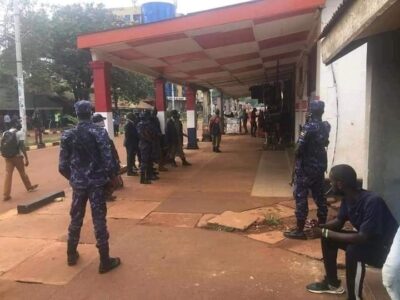Jacob Oulanyah, the 56-year-old former Speaker of the 11th Parliament, died in the United States due to multiple organ failure triggered by lymphoma cancer-related complications, the government said yesterday.
Health minister, Dr Jane Ruth Aceng, refuted the March 20 claim by Oulanyah’s father, Mr Nathan Okori, that his son had informed him that a woman from Acholi was used to poison him in tea.
Revealing what she said were details of the autopsy yesterday, Dr Aceng told Parliament that Oulanyah suffered multiple organ failures due to progressive, recurrent, diffuse large B cell non-Hopkin Lymphoma, a type of cancer of the lymphatic system.
The lymphatic system is the body system that protects against illness-causing invaders, maintaining body fluid levels, absorbing digestive tract fats and removing waste from body. It comprises bone marrow, spleen, tonsils and lymph nodes.
Specifics
Dr Aceng, in specific terms, said Oulanyah’s death followed failure of his liver, lungs, kidney and heart resulting from the cancer, bacterial and viral infections, and bleeding in the intestines and a missing spleen accelerated the demise.
The ex-Speaker’s spleen, the part of the body responsible for making and filtering blood, was removed in 1990 in an emergency operation after government soldiers shot him during a riot at Makerere University where he was a student leader, according to his close friend, and Democratic Party president Norbert Mao.
President Museveni announced the Omoro County MP’s death in Seattle, Washington, on March 20. He had been airlifted there for emergency specialist care, triggering Ugandan Diaspora community protest that erupted in tribalised altercations that sucked in Chief Justice Alfonse Owiny-Dollo.
In her address to Parliament yesterday, Dr Aceng said the particular ill health of the Speaker, which eventually led to his death, started in 2019.
“He [Oulanyah] discovered a swelling in the neck, which was relatively big swelling. And he took it upon himself to seek medical care in Germany. The swelling was a removed and analysed and he was told it was a cancer. He was started on a treatment which he finished at Uganda Cancer Institute,” she said.
Minister Aceng added that even after this, Oulanyah frequently visited several other hospitals because of the type of cancer he suffered from –a recurrent cancer. She said the interruptions in hospital visits during the Covid-19 lockdown, and during his involvement in campaigns for the 2021 elections, worsened his condition.
Admission to hospital
Following this, the minister said on January 23, Oulanyah was admitted at Mulago National Referral Hospital for two weeks during which 15 doctors handling him noticed his complex condition, and referred him to the US.
“While in the hospital [in America], several investigations were repeated. The body tissues were recalled for further analysis. Bone marrow tissues were retaken for analysis and details of all this were provided,” she narrated.
The bone marrow is the part of body doctors at Seattle were targeting to cure him using their Chimeric Receptor T Cell Therapy (CAR-T). Here, doctors harvest bone marrow cells, modify them to develop the receptors and infuse again in the patient to attack the cancer cells.
Oulanyah’s bone marrow was, unfortunately, damaged, according to the post-mortem report.
“The immediate cause[s] of [his] death were four: The immediate cause of death was multi-organ failure – the heart failed, the lungs failed, the liver failed and the kidney failed. The liver started failing while he was still here in Uganda, as well as the lungs that had started collecting water. The heart and the kidney started failing while he was in Seattle,” she added.
Oulanyah was airlifted to Seattle in a commercial Uganda Airlines plane, which was not retrofitted as air ambulance, via Iceland on a journey that took at least 10 hours longer than if he had been hurried to either Germany or France, one of two countries where the procedure he required could be undertaken.
It remained unclear if this delay, coupled with the type of transport, speeded his deterioration.
Organ failure
According to the post-mortem report, Oulanyah also had multiple bacterial infections, which were discovered while in hospital in Uganda and viral infection that was discovered in Seattle, a Pacific coast city in the state of Washington.
Dr Aceng said the infections contributed to the death.
“Unfortunately, the treatment for the viral infection also further suppressed the bone marrow. This was a consequence of total bone marrow suppression, which we call pancytopenia — his bone marrow could no longer produce red blood cells, white blood cells and platelets. And he lived on blood and platelets every day,” she said.
The minister added: “All this resulted from progressive, recurrent, diffuse large B cell non-Hopkin lymphoma, and of course the chemotherapy that he received for quite a while. There were contributory conditions, including a lymphatic system depletion, he lost his spleen while at Makerere University, following that riot.”
Dr Aceng said Oulanyah also had a problem with stem cells, which had a poor immune response because of chemotherapy.
The stem cells are those which have potential to develop into many different types of cells in the body and can be used to restore the blood formation.
“He started having gastrointestinal bleeding or bleeding into the abdomen because of lack of platelets [a type of blood cells], he couldn’t stop the bleeding. He had multi-drug resistant bacteria such as klebsiella, which is usually hospital-acquired when you stay in hospital for too long, the virus was cytomegalovirus, which affected him,” she said.
Post-mortem report
Helath minister Dr Jane Ruth Aceng, in specific terms, said Oulanyah’s death followed failure of his liver, lungs, kidney and heart resulting from the cancer, bacterial and viral infections, and bleeding in the intestines and a missing spleen accelerated the demise.
“The immediate cause[s] of [his] death were four: The immediate cause of death was multi-organ failure – the heart failed, the lungs failed, the liver failed and the kidney failed. The liver started failing while he was still here in Uganda, as well as the lungs that had started collecting water. The heart and the kidney started failing while he was in Seattle,” she said.
- Additional Reporting from Daily Monitor












